Kaluza has partnered Vento Ludens to bid its Muirake wind farm into the Optional Downward Flexibility Management service.
The National Grid ESO service was introduced in May to help manage low levels of demand during the COVID-19 lockdown by cutting the renewable generators signed up to the service.
The Muirake wind farm – located in Aberdeenshire – is the latest renewable generator to enter into the service, with Kaluza stating that this well help it establish how distributed generation can be used as a “meaningful resource” at a whole system level.
The Optional Downward Flexibility Management service was also praised by Kaluza as being the first of several National Grid ESO market opportunities for renewable generators, helping to drive new revenue streams.
However, the energy tech firm was quick to affirm it is looking to ensure future renewable generators will be able to keep generating as much as possible, even as times of low demand, citing solutions such as using the storage capabilities of electric vehicles (EVs) or storage heaters.
Using EVs and domestic heating for flexibility is already being done by Kaluza, which in August lauded the milestone of providing Western Power Distribution flexibility from domestic batteries and EVs using vehicle-to-grid and smart charging using one platform.
Heating is also being trialed by Kaluza, having launched a project in March looking into the possibility of using internet-connected storage heaters to reduce bills and emissions alongside Dimplex and EDF.
Conor Maher-McWilliams, head of flexibility at Kaluza, said that the COVID-19 lockdown has shown that demand patterns can’t always be “easily predicted”.
This will be even more of a challenge as transport continues to be electrified and more renewables – such as the 40GW of wind the government has pledged to facilitate by 2030 – meaning new ways to “bridge the gap between the national grid and individual, distributed renewable generators on the ground” have to be found.
“The ambition now is to extend the platform’s deep expertise in flexibility markets and optimisation algorithms, to create a valuable balancing resource for use at a national level. In doing so we can show how a highly decentralised system can come together in an orchestrated response to the grid’s evolving needs.”





